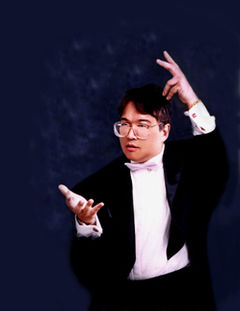Ayodhya (opera): Difference between revisions
No edit summary |
No edit summary |
||
| Line 3: | Line 3: | ||
====Region: [[:Category:Asia|Asia]]==== | ====Region: [[:Category:Asia|Asia]]==== | ||
====Subject: [[:Category:Political/Economic/Social Opinion|Political/Economic/Social Opinion | ====Subject: [[:Category:Political/Economic/Social Opinion|Political/Economic/Social Opinion]]==== | ||
====Medium: [[:Category:Performance Art|Performance Art]], [[:Category:Theatre|Theatre]]==== | ====Medium: [[:Category:Performance Art|Performance Art]], [[:Category:Theatre|Theatre]]==== | ||
| Line 33: | Line 33: | ||
[[Category:Political/Economic/Social Opinion]] | [[Category:Political/Economic/Social Opinion]] | ||
[[Category:Performance Art]] | [[Category:Performance Art]] | ||
Latest revision as of 19:09, 11 November 2016
Date: 2006
Region: Asia
Subject: Political/Economic/Social Opinion
Medium: Performance Art, Theatre
Artist: Somtow Sucharitkul (b. 1952)
Confronting Bodies: The Thai Government, and the Thai Ministry of Culture
Date of Action: November 2006
Location: Bangkok, Thailand
Description of Artwork: Written and composed by Somtow Sucharitkul, the opera Ayodhya, with an international cast led by British counter-tenor Michael Chance, is a retelling of the Ramayana epic. Ayodhya broke with tradition in depicting the death of a key character, the demon king, known as Thotsakan in the Thai version but Ravan in the opera. The story is usually depicted as a stylized masked drama in which the dying happens off stage.
The Incident: In a country still jittery after the September, 2006 military coup, officials from the Ministry of Culture, an Orwellian body charged with protecting Thailand's heritage and morals, claimed that the opera Sucharitkul wrote as a tribute to the Thailand's beloved King Bhumipol, would bring bad luck. A few days before the opera was set to debut, Thai ministry officials approached Sucharitkul, forcing him to change his work or risk it being shut down.
Results of Incident: Ultimately, the opera went ahead, but Sucharitkul was warned that, if anything offended the "morals of Thailand", the ministry would intervene. Sucharitkul insists he refused to be censored: "Not a note or word was cut, but the ministry would hardly know that. They were willing to shut us down, based entirely on scenes that were rumoured to be in it. This is not about the death of Thotsakan. The issue is that the Culture Ministry should have nothing to do with regulating the arts at all." With Thailand grappling to find a workable and - if not democratic - liberal model, censorship raises questions about fundamental freedoms. Former senator Kraisak Choonhavan is organizing a meeting of artists to discuss the problem, but sees the ministry's actions as part of the "poverty of state policy of art and culture". The ministry says the matter is closed. "The final scene [of Ayodhya] was adjusted. The matter has ended rather well," said Prisana Phongthatsirikul, secretary-general of the National Culture Commission.
Source: Guardian News and Media

